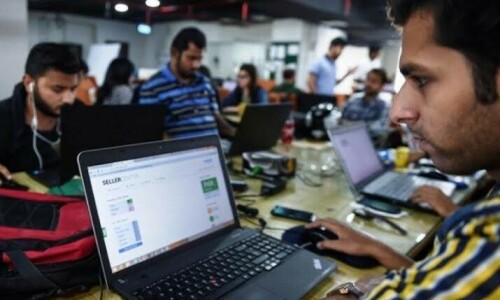BRUSSELS: France hopes to mark its stint as European Union president from July by presenting ambitious ideas on how to reform the bloc’s agricultural policy.
But some diplomats fear President Nicolas Sarkozy’s suggestions to spur domestic production and make Europe less dependent on imports masks a protectionist stance that does little to change the Common Agricultural Policy (CAP).
France is by far the largest cash beneficiary of the CAP, which eats up $69.35 billion a year around 40 per cent of the whole EU budget. France is Europe’s single biggest grains producer and also a major livestock exporter.
EU diplomats and officials have monitored a stream of rhetoric from Paris that they say suggests a desire to modernise farm policy, but which also hints at old-style protectionism.
Sarkozy and Agriculture Minister Michel Barnier have both talked of giving priority to EU farm products over imports, which is usually achieved via tariffs, as well as raising quality and sanitary standards for food imports.
Diplomats say the French president clearly wants to ‘do something’ about the CAP, but they remain to be convinced that anything much will change under the six-month French presidency.
“The most likely outcome is something that will enable the French to say they kicked off the debate on what the
CAP should look like,” one EU diplomat said.
“Politically, Sarkozy feels he can’t be looking backwards. There aren’t many new ideas, a lot of it is a rehash of old ideas,” he said. “And there are a lot of contradictions between forward-looking language and backward-looking detail.”
French officials are at pains to stress that the country has already worked out its ideas for reshaping EU farm policy and that it hopes Europe can hang on to certain market agricultural safety nets rather than get rid of them altogether.
“When they (EU mechanisms) are efficient, we need to maintain them even if we only use them depending on market conditions,” one source close to the agriculture ministry said.
The CAP includes safety mechanisms, notably the intervention system that guarantee growers a minimum price for their products if they sell to the EU and put them in public silos.
France also wants its various agricultural sectors to be given some financial aid so they can withstand weather-related and sanitary risks and its fragile sectors and regions to receive greater support.
But some officials in Brussels are worried.
One insider at the European Commission’s agriculture unit said some of the French language rang alarm bells, particularly where it related to the EU’s international trade commitments.
“Politically, these Sarkozy speeches sound great. But when you look at the detail, they talk about increased border tariffs,” the insider said.
‘SAFETY-NETS’
“French officials have also suggested safety-nets when farmers do not get enough money from the market. That sounds like increasing aid when prices go down exactly the kind of thing that we have been criticising the Americans for,” he said.
Whatever France may suggest for the CAP during its EU presidency, no EU agriculture commissioner will want to ignore the country in any debate affecting farm policy.
The Commission, the EU’s executive, will also defend what it sees as recent moves away from trade-distorting subsidies and towards more environmentally friendly farming.
Arguing that Europe should insist on the same standards for imports that it applies to local products, France says the EU has a duty to ensure its own energy and food independence.
This is not protectionism, it says, but just upholds the longstanding doctrine of “community preference” established at the birth of the CAP in the early 1960s.
Over the years, that preference where EU products are favoured over imports has eroded, since tariffs have fallen.
During the French presidency, EU Agriculture Commissioner Mariann Fischer Boel aims to get agreement for her CAP ‘health check’ in effect, a mini-reform.
Attention will then focus on the long-term EU budget.—Reuters












































Dear visitor, the comments section is undergoing an overhaul and will return soon.